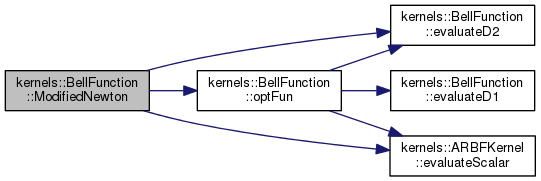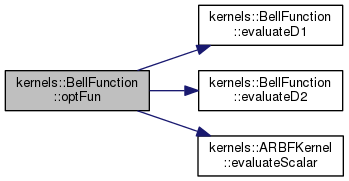 |
KerMor
0.9
Model order reduction for nonlinear dynamical systems and nonlinear approximation
|
 |
KerMor
0.9
Model order reduction for nonlinear dynamical systems and nonlinear approximation
|
BELLFUNCTION Summary of this class goes here Detailed explanation goes here. More...
BELLFUNCTION Summary of this class goes here Detailed explanation goes here.
Definition at line 18 of file BellFunction.m.
Public Member Functions | |
| BellFunction () | |
| function c = | getGlobalLipschitz () |
| Computes the absolute value of the first derivative at x0 Implements the template method from BaseKernel. More... | |
| function copy = | clone (copy) |
| The interface method with returns a copy of the current class instance. More... | |
| function rtmp = | ModifiedNewton (rstart, s) |
| virtual function dr = | evaluateD1 () |
| Method for first derivative evaluation. More... | |
| virtual function ddr = | evaluateD2 () |
| Method for second derivative evaluation. More... | |
 Public Member Functions inherited from kernels.ARBFKernel Public Member Functions inherited from kernels.ARBFKernel | |
| ARBFKernel () | |
| function K = | evaluate (matrix< double > x,matrix< double > y) |
| Evaluates the rotation and translation invariant kernel. More... | |
| function bool = | eq (B) |
| function r = | getSqDiffNorm (matrix< double > x,matrix< double > y) |
| Returns the weighted squared norm \(r\) of the difference \(\noG{x-y}^2/\gamma^2\). More... | |
| virtual function phir = | evaluateScalar (matrix< double > r) |
| Allows the evaluation of the function \(\phi(r)\) for scalar \(r\) directly. More... | |
 Public Member Functions inherited from kernels.BaseKernel Public Member Functions inherited from kernels.BaseKernel | |
| BaseKernel () | |
| function fcn = | getLipschitzFunction () |
| Method that allows error estimators to obtain a lipschitz constant estimation function from this kernel. More... | |
| function bool = | eq (B) |
| Checks if a kernel equals another kernel. More... | |
| virtual function Nabla = | getNabla (x, y) |
| Computes the partial derivatives with respect to each component of the first argument. More... | |
 Public Member Functions inherited from KerMorObject Public Member Functions inherited from KerMorObject | |
| KerMorObject () | |
| Constructs a new KerMor object. More... | |
| function | display () |
| disp(object2str(this)); More... | |
| function bool = | eq (B) |
| Checks equality of two KerMor objects. More... | |
| function bool = | ne (B) |
| Checks if two KerMorObjects are different. More... | |
| function cn = | getClassName () |
| Returns the simple class name of this object without packages. More... | |
 Public Member Functions inherited from DPCMObject Public Member Functions inherited from DPCMObject | |
| DPCMObject () | |
| Creates a new DPCM object. More... | |
| DPCMObject () | |
Public Attributes | |
| r0 | |
| Point of maximum first derivative on scalar evaluation. More... | |
| NewtonTolerance = 1e-7 | |
| Error tolerance for modified newton iteration. More... | |
| MaxNewtonIterations = 5000 | |
| Hard break for iteration count of modified newton algorithm. More... | |
| rm | |
| The maximum ("right") value for any \(r_s\). More... | |
 Public Attributes inherited from kernels.ARBFKernel Public Attributes inherited from kernels.ARBFKernel | |
| double | Gamma = 1 |
| Univariate scaling. More... | |
 Public Attributes inherited from kernels.BaseKernel Public Attributes inherited from kernels.BaseKernel | |
| matrix< double > | G = 1 |
| The matrix \(\vG\) that induces the state space scalar product \(\spG{x}{y}\) and norm \(\noG{x-y}\) to use. More... | |
| matrix< double > | P = "[]" |
| Projection/selection matrix \(\vP\) for argument components. More... | |
| logical | IsRBF = false |
| Flag that determines if the current kernel is a radial basis function, i.e. its evaluation is of the form \(\K(x,y) = \phi(\noG{x-y})\) for some scalar function \(\phi\). More... | |
| logical | IsScProd = false |
| Flag that determines if the current kernel bases on scalar product evaluations, i.e. are of the form \(\K(x,y) = \phi(\spG{x}{y})\) for some scalar function \(\phi\). More... | |
 Public Attributes inherited from DPCMObject Public Attributes inherited from DPCMObject | |
| WorkspaceVariableName = "" | |
| The workspace variable name of this class. Optional. More... | |
| ID = "[]" | |
| An ID that allows to uniquely identify this DPCMObject (at least within the current MatLab session/context). More... | |
| PropertiesChanged = "[]" | |
| The Dictionary containing all the property settings as key/value pairs. More... | |
 Public Attributes inherited from handle Public Attributes inherited from handle | |
| addlistener | |
| Creates a listener for the specified event and assigns a callback function to execute when the event occurs. More... | |
| notify | |
| Broadcast a notice that a specific event is occurring on a specified handle object or array of handle objects. More... | |
| delete | |
| Handle object destructor method that is called when the object's lifecycle ends. More... | |
| disp | |
| Handle object disp method which is called by the display method. See the MATLAB disp function. More... | |
| display | |
| Handle object display method called when MATLAB software interprets an expression returning a handle object that is not terminated by a semicolon. See the MATLAB display function. More... | |
| findobj | |
| Finds objects matching the specified conditions from the input array of handle objects. More... | |
| findprop | |
| Returns a meta.property objects associated with the specified property name. More... | |
| fields | |
| Returns a cell array of string containing the names of public properties. More... | |
| fieldnames | |
| Returns a cell array of string containing the names of public properties. See the MATLAB fieldnames function. More... | |
| isvalid | |
| Returns a logical array in which elements are true if the corresponding elements in the input array are valid handles. This method is Sealed so you cannot override it in a handle subclass. More... | |
| eq | |
| Relational functions example. See details for more information. More... | |
| transpose | |
| Transposes the elements of the handle object array. More... | |
| permute | |
| Rearranges the dimensions of the handle object array. See the MATLAB permute function. More... | |
| reshape | |
| hanges the dimensions of the handle object array to the specified dimensions. See the MATLAB reshape function. More... | |
| sort | |
| ort the handle objects in any array in ascending or descending order. More... | |
Protected Member Functions | |
| function [
g , dg , pi , pl , pr ] = | optFun (r, s, n, dn) |
 Protected Member Functions inherited from KerMorObject Protected Member Functions inherited from KerMorObject | |
| function | checkType (obj, type) |
| Object typechecker. More... | |
 Protected Member Functions inherited from DPCMObject Protected Member Functions inherited from DPCMObject | |
| function | registerProps (varargin) |
| Call this method at any class that defines DPCM observed properties. More... | |
| function | registerProps (varargin) |
Static Protected Member Functions | |
| static function this = | loadobj (this, from) |
| As the constant properties are transient, they have to be re-computed upon loading. More... | |
 Static Protected Member Functions inherited from DPCMObject Static Protected Member Functions inherited from DPCMObject | |
| static function obj = | loadobj (obj, from) |
| Re-register any registered change listeners! More... | |
| static function obj = | loadobj (obj, from) |
Additional Inherited Members | |
 Protected Attributes inherited from kernels.BaseKernel Protected Attributes inherited from kernels.BaseKernel | |
| fG = 1 | |
| fP = "[]" | |
| kernels.BellFunction.BellFunction | ( | ) |
Definition at line 139 of file BellFunction.m.
References DPCMObject.registerProps().

|
virtual |
The interface method with returns a copy of the current class instance.
| target | If clone was called for a subclass of this class, target must contain the new instance of the subclass that is to be the cloned result. |
Reimplemented from kernels.ARBFKernel.
Definition at line 156 of file BellFunction.m.
References MaxNewtonIterations, NewtonTolerance, r0, and rm.
|
pure virtual |
Method for first derivative evaluation.
Referenced by getGlobalLipschitz(), optFun(), and demos.BellFunctions.SecantGradientPlots().

|
pure virtual |
Method for second derivative evaluation.
Referenced by ModifiedNewton(), and optFun().

|
virtual |
Computes the absolute value of the first derivative at x0 Implements the template method from BaseKernel.
Implements kernels.BaseKernel.
Definition at line 145 of file BellFunction.m.
References evaluateD1(), and r0.

|
staticprotected |
As the constant properties are transient, they have to be re-computed upon loading.
Any subclasser MUST call this superclasses loadobj function explicitly!
Definition at line 371 of file BellFunction.m.
References KerMorObject.KerMorObject(), MaxNewtonIterations, and NewtonTolerance.

| function rtmp = kernels.BellFunction.ModifiedNewton | ( | rstart, | |
| s | |||
| ) |
Definition at line 170 of file BellFunction.m.
References evaluateD2(), kernels.ARBFKernel.evaluateScalar(), MaxNewtonIterations, NewtonTolerance, and optFun().
Referenced by demos.BellFunctions.SecantGradientPlots().


|
protected |
Definition at line 310 of file BellFunction.m.
References evaluateD1(), evaluateD2(), kernels.ARBFKernel.evaluateScalar(), r0, and rm.
Referenced by ModifiedNewton().


| kernels.BellFunction.MaxNewtonIterations = 5000 |
Hard break for iteration count of modified newton algorithm.
Default: 5000
SetObservable set to true. Definition at line 92 of file BellFunction.m.
Referenced by clone(), loadobj(), and ModifiedNewton().
| kernels.BellFunction.NewtonTolerance = 1e-7 |
Error tolerance for modified newton iteration.
Default: 1e-7
SetObservable set to true. Definition at line 77 of file BellFunction.m.
Referenced by clone(), loadobj(), and ModifiedNewton().
| kernels.BellFunction.r0 |
Point of maximum first derivative on scalar evaluation.
Dependent set to true. SetObservable set to true. Definition at line 61 of file BellFunction.m.
Referenced by clone(), getGlobalLipschitz(), optFun(), and demos.BellFunctions.SecantGradientPlots().
| kernels.BellFunction.rm |
The maximum ("right") value for any \(r_s\).
SetAccess = Private, GetAccess = Public Definition at line 109 of file BellFunction.m.
Referenced by clone(), optFun(), and demos.BellFunctions.SecantGradientPlots().